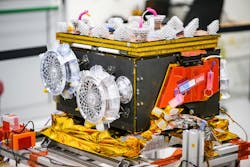The journey to the Martian moon Phobos begins
TOKYO - The German-French rover IDEFIX travels to Japan and is expected to arrive there at the end of January. It is part of the Martian Moons eXploration (MMX) mission, which will explore both Martian moons under the leadership of the Japan Aerospace Exploration Agency, JAXA. The aim is to resolve the mystery surrounding the formation of Phobos and Deimos. As part of the mission, IDEFIX will perform the first-ever landing on Phobos in order to explore its surface directly. The Japanese mothercraft will collect samples from Phobos and bring them back to Earth. The German Aerospace Center (Deutsches Zentrum für Luft- und Raumfahrt; DLR) delivered the partially assembled rover and two instruments in 2022. Construction of IDEFIX was recently completed at the facility of the French space agency CNES in Toulouse. The integration of the rover into the MMX mothercraft will begin in Japan in February 2024. The launch of the mission is currently scheduled for 2026, DLR reports. Continue reading original article.
The Military & Aerospace Electronics take:
Date goes Here -"Together with our French partners at CNES, we are delighted that IDEFIX is now making its way to Japan to travel to the Martian moon Phobos on board the MMX mission in close cooperation with JAXA," said Anke Kaysser-Pyzalla, Chair of the DLR Executive Board. "Japan and France are important strategic partner countries for DLR in almost all of our research areas, and the joint work of JAXA, CNES, and DLR on the MMX mission is an excellent example of what we can achieve together."
"We are very happy that IDEFIX is now traveling to Japan. This is another important milestone in the fruitful cooperation between CNES, JAXA and DLR on the MMX mission. This mission will lead to major advances in the knowledge of the Solar System, and we are proud to have built this partnership with Japan and Germany," says Philippe Baptiste, President of CNES.
Related: NASA announces 12 companies that will collaborate on Moon-to-Mars technology
Related: Blue Origin chosen by NASA to launch its Mars magnetosphere study mission
Related: NASA's JPL selects Marotta Controls components for Mars sample retrieval mission
Jamie Whitney, Senior Editor
Military + Aerospace Electronics
